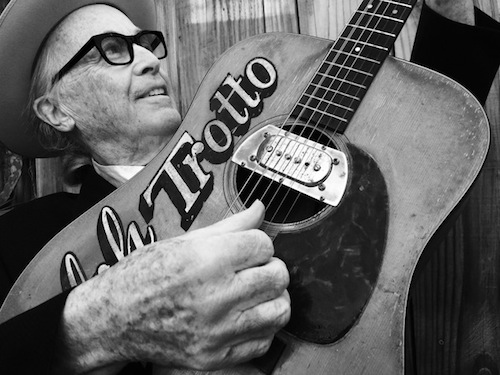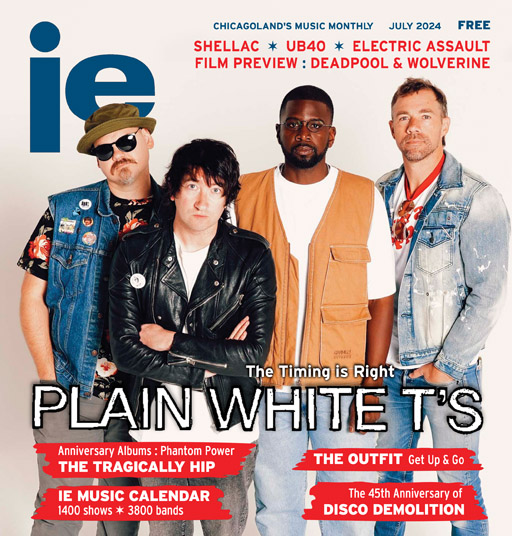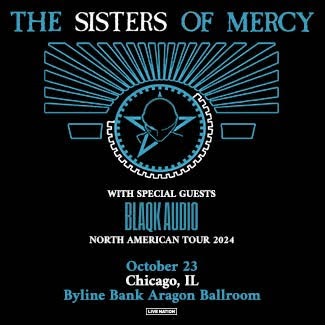Live Review: Ry Cooder at Thalia Hall
Ry Cooder’s lengthy resume includes a pile of highlights. Among them are six Grammy awards, evocative soundtrack albums for films including Paris, Texas, collaboration with previously-hidden musical treasures of Cuba with Buena Vista Social Club, and profoundly influencing the signature sound of the Rolling Stones. Cooder also has a stack of great albums to his own name including his new The Prodigal Son LP, shaped by his in-depth knowledge of folk and roots music, steeped in blues and Gospel, and featuring his unmatched skill on slide guitar.
What Cooder doesn’t have is a long list of concert stops in Chicago. Sunday’s visit was, therefore, an eagerly-anticipated treat for local blues aficionados and guitar freaks. The show began with Cooder seated and surrounded by a ring of gear as he started a solo version of the recriminatory Gospel blues song “Nobody’s Fault but Mine.” Cooder could have kept the audience riveted with his acoustic guitar and bottleneck slide alone, but he crafted the sound into something haunting and spectral.
Praising the lived-in character and history of Thalia Hall, Cooder recalled his last visit to Chicago in 2015 to perform bluegrass with Ricky Skaggs, Sharon White and his son Joachim on drums. “This is a beautiful place you have,” said Cooder. “I’m glad to see it hasn’t become Thalia Whole Foods.”
Cooder got to his feet for the propulsive “Everybody Ought to Treat a Stranger Right.” The song was augmented by R&B trio the Hamiltones, whose close harmony elevated the driving rhythm alongside gritty baritone saxophone and shimmering electric piano.
Cooder made a pitch for his wares and connected it to one of his key influences. “As Carter Stanley would say, ‘Every song we sing up here is for sale out there.’” As promised, material from The Prodigal Son comprised much of the set. The downtempo and melancholy “Straight Street” is an emotional tale about moving to the straight and narrow path as a means of shedding turmoil and finding inner peace. “Go Home Girl” visited 1979’s Bop Till You Drop, combining doo-wop and Latin rhythm in a song about a man struggling to resist the advances of his best friend’s girl.
Cooder stoked a different kind of trouble next. “Let’s see, what would you like to hear?” he said, mulling his set list. Requests from the eager audience came fast and furious. “Oh, never mind,” said Cooder, realizing the can of worms he had opened. “We won’t start that.”
The evening’s only real glitch happened when Cooder announced that his main amp had been left on standby during the first stretch of songs. Although there had been no complaints about sound quality in the house, the ensuing songs including “The Very Thing That Makes You Rich (Makes Me Poor)” did become sonically richer with Cooder’s unmatched guitar tone at full strength.
The musician’s musician also made time for his band. “Right about now I’m going to go get my oxygen off stage, and let you hear one of the Hamiltones’ original songs,” joked the 71-year-old Cooder. The Hamiltones’ pleading “Highway 74” found the trio trading solos and intertwining their supple tenor voices. The song’s glasslike electric piano and deep bass groove revealed the influence of R&B mastermind Marvin Gaye and an affinity for accessible pop favorites like Hall & Oates’ “She’s Gone.”
Cooder returned for a mournful slide workout during Woody Guthrie’s “Vigilante Man.” The solo excursion included spine-tingling harmonics that surprised even the player himself. “Yeah,” Cooder exclaimed in delight as his fingers found their mark. “That’s hard to do,” he said. “It’s nice when you get it, and a mess when you don’t.” Cooder augmented Guthrie’s lyrics with a verse for Trayvon Martin in remembrance of the youth and others cut down due to misplaced fear and abuse of power.
New song “Jesus and Woody” imagined Guthrie in Heaven, having a conversation with Jesus. The pair wondered “Where did all get us?” as a lifetime of earthly good works and dreams seemed to have gone rewarded by a lack of brotherly love. “Guess I like sinners better than fascists,” remarks Cooder’s Jesus.
Another pair of Gospel songs followed, including “Jesus on the Mainline” from 1974’s Paradise and Lunch and The Prodigal Son’s “You Must Unload.”
Next, Cooder turned his attention to a different savior. “In ’55, Johnny cash rescued me from the fourth grade,” said Cooder, explaining that Cash’s refreshing sound made life bearable, and declaring with only half a wink that those school days were “a tremendous waste of time.” Cooder described a surreal meeting in which The Man in Black himself arrived in a stretch limo to thank him for playing Cash’s “Get Rhythm.” Cooder’s hot band then played a rambunctious version of the song that surely would have earned newfound appreciation by the original author.
Cooder and his core band encored with a twinkling, cinematic version of “Harbor of Love” that revealed an impressive sensitivity and skill at all positions of the band. The song looked forward to a future when pain and sorrow have become but a distant memory. Afterward, Cooder said that the group had only worked out the new arrangement at four o’clock that afternoon. “I like to play songs I don’t know,” he said.
The show concluded with another dip into Bop Till You Drop. “Little Sister” took the Elvis Presley favorite in the direction of pals in the Rolling Stones’ Exile on Main Street. “I Can’t Win” again featured the Hamiltones’ sweet, street-corner harmony. Cooder reviewed the performance himself. “That was mighty fine,” he said. “We enjoyed that one, I must say.” Waving goodbye the 71-year-old added, “See you in ten years.” It’s not nearly often enough, but it’s something to look forward to.
– Jeff Elbel
Category: Live Reviews, Stage Buzz











